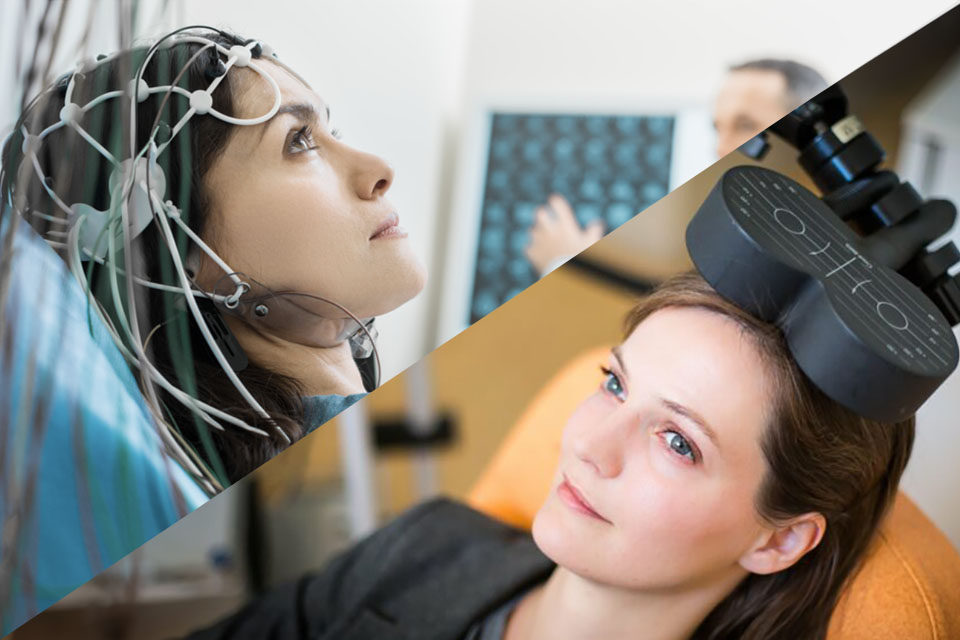
MeRT FAQs
Providing answers to help you make the most informed decision about MeRT treatment.
MeRT Treatment FAQs
General Information about MeRT
What is MeRT?
MeRT is a non-invasive, drug-free treatment that combines qEEG (quantitative EEG brain mapping), EKG, and targeted rTMS (repetitive transcranial magnetic stimulation) to create a treatment plan unique to your brainwave patterns.
How does MeRT work?
We perform advanced brain mapping to identify networks that are under- or over-communicating. Using this data, we deliver customized stimulation to encourage healthier brain communication and function.
What conditions do you treat with MeRT?
Patients come to us for help with:
- Autism spectrum disorder (ASD)
- Depression (including Treatment-Resistant Depression)
- Anxiety and sleep disorders
- Post-traumatic stress disorder (PTSD)
- Traumatic brain injuries (TBI), concussions
- Cognitive decline
How is MeRT different from other therapies (ECT, TMS, VNS, DBS, neurofeedback)?
- ECT requires anesthesia and drugs; MeRT does not.
- VNS/DBS require surgery and implanted devices; MeRT is fully non-invasive.
- Standard TMS uses a one-size-fits-most protocol; MeRT is customized to each person’s qEEG/EKG.
- Neurofeedback trains you to change brain activity; MeRT directly stimulates and guides brainwave patterns.
What research supports MeRT?
MeRT builds on decades of peer-reviewed studies in neuromodulation and rTMS. rTMS is FDA-cleared for Major Depressive Disorder and OCD; MeRT applies this technology in a more personalized way for a broader range of neurological conditions. (See our Science page for published studies.)
Is MeRT safe?
Yes. Side effects are minimal and generally mild, most often a temporary tension headache or mild fatigue. Seizure risk is very low, and we carefully screen and monitor patients to minimize it further.
Eligibility & Safety
Am I a candidate for MeRT?
We determine your eligibility from your health history, qEEG/EKG results, and a clinical evaluation. Together, we’ll decide if MeRT is appropriate.
Can children receive MeRT?
Yes. We treat children on the autism spectrum and with other conditions when appropriate, with full caregiver involvement.
What if I have seizures or bipolar disorder?
Both are considered relative contraindications. Our clinicians will evaluate carefully and adjust protocols if treatment is deemed safe.
Are there specific contraindications to treatment?
Absolute contraindications: Pacemaker, ICD, VNS/DBS, magnetic/ferrous cranial implants, certain aneurysm clips/coils, cochlear/ocular implants, pregnancy/breastfeeding, active brain cancer, magnetic dental implants.
Relative contraindications: Seizure history, bipolar disorder, titanium stents/shunts, spinal cord stimulator, hearing aids, magnetic ink tattoos, Baha implants.
Can I continue medications during treatment?
In most cases, yes. Never adjust or stop medications without your prescribing provider’s guidance. We will coordinate care when needed.
What should I avoid before treatment?
We recommend limiting caffeine before your session, avoiding alcohol the night before, and informing us of any supplements or new medications.
Evaluation, Testing & First Visit
What happens at the first appointment?
We perform a qEEG and EKG to capture brain and heart data. Both tests are painless, non-invasive, and take about 45 minutes.
How should I prepare for my first qEEG?
- Clean, dry hair (no heavy hair products)
- Bring a list of medications/supplements
- Limit caffeine before testing
- Avoid alcohol the night before
Can part of the process be done by telemedicine?
Yes, clinical reviews and follow-up appointments can often be conducted remotely. The qEEG, EKG, and treatment sessions must be in-clinic.
Treatment Protocols
What does the MeRT protocol look like?
Four steps: Evaluation → Analysis → Treatment → Progress Evaluation.
- Daily treatments: 5 days a week
- Initial 2-week assessment period
- Continued care in 2-week increments if progress is seen
How long is each session?
Sessions last about 30-45 minutes, with magnetic stimulation applied for 6–8 seconds each minute.
How many weeks of treatment will I need?
Most patients complete 6–8 weeks for the best results. Protocols vary by condition and individual progress.
Can I work or drive after treatment?
Yes, most patients resume normal daily activities right after their session.
What if I miss a session?
Consistency is important, but we understand life happens. We’ll adjust scheduling if you need to miss a session.
Can MeRT be combined with other therapies?
Yes. Improved brain function often enhances the effectiveness of psychotherapy, OT, speech therapy, and other interventions.
Results & Aftercare
When will I start to notice changes?
Many patients notice improvements in sleep, mood, or focus within the initial 2-week assessment. We confirm with follow-up qEEG/EKG and clinical review.
How long do results last?
Durability varies, but many patients experience long-term improvement. Some choose occasional booster sessions during stressful times or after illness.
How do you track progress?
We use repeat qEEG/EKG, symptom reports, and regular check-ins to measure improvement and adjust your protocol.
What improvements are most common?
- Better sleep and energy
- Clearer thinking
- Reduced anxiety and stress
- Improved mood
- Stronger focus and attention
- Greater sociability and emotional balance
- Increased self-confidence and resilience
Insurance & Payment
Does insurance cover MeRT?
We are considered out-of-network with most insurance providers. At this time, we do not accept Medicare or Medicaid.
rTMS is FDA-cleared for depression and OCD, but coverage for MeRT’s broader applications is limited. We can provide documentation for you to submit to your insurance company for possible reimbursement (usually for EEGs or evaluations).
What payment options are available?
- All major credit cards
- CareCredit (often 0% interest for 12 months)
- HSA/FSA funds
How much does treatment cost?
Costs depend on evaluation, mapping, and the number of weeks recommended. We’ll provide a detailed estimate after your initial consultation.
Clinic Information & Scheduling
Who provides care at Brain Treatment Center Glenview?
Our clinic is led by Dr. Mina Paiman, a highly experienced physician specializing in MeRT and individualized brain health. She and her team are dedicated to tailoring each treatment plan to your unique needs.
Do you allow caregivers/parents to be present?
Yes. Caregivers are welcome at visits, and their input is an important part of care planning and progress monitoring.
Is your clinic accessible?
Yes, our Glenview clinic is wheelchair accessible. Please notify us of any mobility or language support needs so we can accommodate you.
How do I schedule a consultation?
Call our New Patient Coordinator at 773-970-6700. She’ll answer questions and schedule your evaluation. You can also fill out the form on our Contact page, and we’ll get in touch.

